Comprehensive Guide to Garden Fence Installation in Lewisham
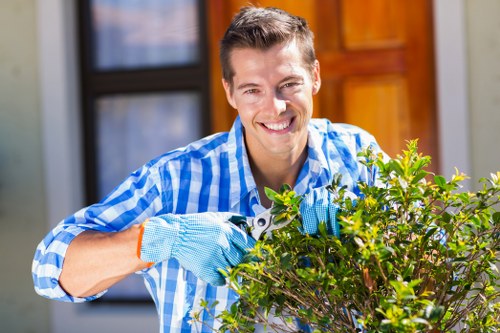
Installing a garden fence in Lewisham is a fantastic way to enhance your property's aesthetic appeal, provide privacy, and ensure security for your loved ones and pets. Whether you’re looking to create a serene backyard retreat or need a sturdy barrier around your home, understanding the fundamentals of garden fence installation is crucial.
Lewisham, with its diverse neighborhoods and varying property styles, offers unique opportunities and challenges when it comes to garden fencing. From traditional wooden fences to modern metal designs, the options are vast and cater to different tastes and requirements.
Before diving into the installation process, it's essential to consider factors such as the type of fence, materials, local regulations, and the specific needs of your garden. This guide will walk you through everything you need to know about garden fence installation in Lewisham, ensuring a smooth and successful project.
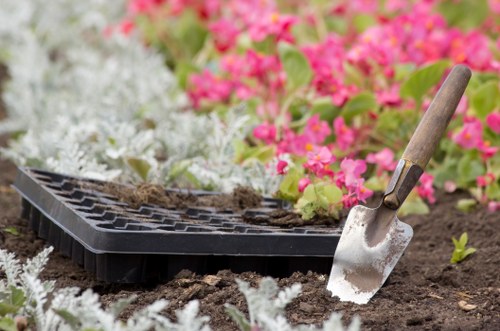
Choosing the Right Type of Fence
Selecting the appropriate fence type is the first step in your garden fence installation journey. The choice depends on your primary goals, whether it's privacy, security, decoration, or all of the above.
1. Privacy Fences
Privacy fences are designed to block the view from the outside, creating a secluded environment in your garden. Common materials include:
- Wood: Offers a natural look and can be customized with various finishes.
- Vinyl: Durable and low-maintenance, available in different styles.
- Composite: Combines wood fibers and plastic, providing longevity and resistance to weather.
2. Security Fences
If security is a primary concern, consider sturdy materials like metal or wrought iron. These fences are difficult to climb and can deter potential intruders.
3. Decorative Fences
For aesthetic purposes, decorative fences add charm and character to your garden. Materials can vary from intricate metal designs to elegant wooden lattice panels.
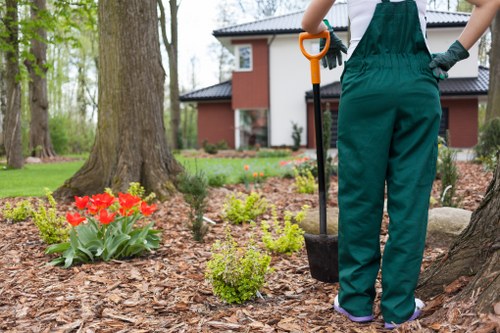
Materials for Garden Fences
The material you choose impacts the durability, maintenance, and overall appearance of your fence. Here are some popular options:
Wood
Wooden fences are a classic choice, offering versatility and natural beauty. They can be painted or stained to match your garden's theme. However, they require regular maintenance to prevent rot and damage from pests.
Metal
Metal fences, such as iron or aluminum, are known for their strength and longevity. They are often chosen for security purposes and can be designed with ornate details to enhance visual appeal.
Vinyl
Vinyl fences are increasingly popular due to their low maintenance and wide range of styles. They resist fading, cracking, and warping, making them a practical choice for many homeowners.
Composite
Composite fencing combines the best of wood and plastic, offering durability and resistance to weather changes. It's an eco-friendly option, as it often uses recycled materials.
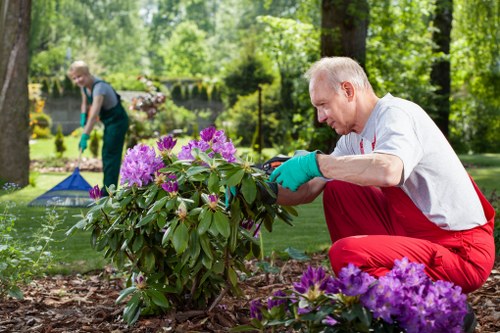
Understanding Local Regulations
Before installing a fence in Lewisham, it's crucial to understand local regulations and guidelines. These rules ensure that your fence complies with community standards and legal requirements.
Planning Permission
In most cases, fences in backyards do not require planning permission. However, there are exceptions, especially for taller fences or those near boundaries. It's advisable to check with the Lewisham Council to determine if you need permission for your specific fence.
Boundary Considerations
When placing a fence, ensure it does not encroach on neighboring properties. Maintaining proper boundary lines helps avoid disputes and ensures compliance with local laws.
Height Restrictions
Lewisham may have specific height restrictions for fences, particularly in residential areas. Typically, the maximum height allowed is around 2 meters, but it's essential to verify the exact limits with local authorities.
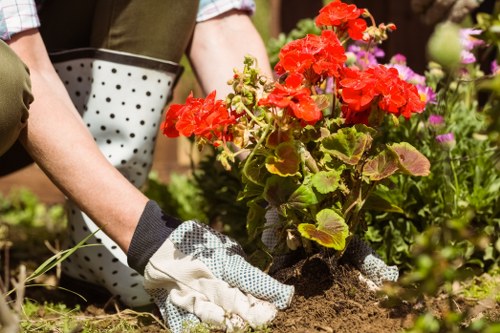
The Installation Process
Installing a garden fence involves several steps, from planning and preparation to the actual construction and finishing touches. Here's a breakdown of the typical process:
1. Planning and Measurement
Begin by measuring the area where you intend to install the fence. Determine the length, height, and any specific design features you want to include.
2. Obtaining Permissions
As mentioned earlier, check with Lewisham Council to ensure your fence complies with local regulations. Obtain any necessary permissions before proceeding.
3. Preparing the Site
Clear the installation area of any obstacles, such as plants or debris. Ensure the ground is level to provide a stable foundation for the fence posts.
4. Installing Fence Posts
Fence posts are the backbone of your fence. Dig holes at regular intervals, typically spaced 6 to 8 feet apart. Insert the posts and secure them with concrete to ensure stability.
5. Attaching Fence Panels or Rails
Once the posts are secure, attach the fence panels or rails according to your chosen design. Ensure each section is level and properly aligned.
6. Finishing Touches
Apply any desired finishes, such as paint or stain, to protect the fence and enhance its appearance. Regular maintenance will keep your fence looking great for years to come.
Benefits of Professional Installation
While DIY installations can be rewarding, hiring professionals for garden fence installation in Lewisham offers several advantages:
Expertise and Experience
Professional installers have the skills and knowledge to handle various fence types and materials, ensuring a high-quality result.
Time and Efficiency
Experts can complete the installation faster than most DIY enthusiasts, saving you time and effort.
Compliance with Regulations
Professionals are familiar with local regulations and can ensure your fence meets all legal requirements, avoiding potential issues down the line.
Cost-Effective
While hiring professionals may seem more expensive initially, their expertise can prevent costly mistakes and extend the lifespan of your fence.
Maintenance Tips
Proper maintenance ensures your garden fence remains in excellent condition. Here are some tips to keep your fence looking its best:
- Regular Cleaning: Remove dirt, debris, and mildew to prevent deterioration.
- Inspect for Damage: Regularly check for loose boards, rust, or other signs of wear and repair them promptly.
- Apply Protective Coatings: Repaint or stain wooden fences to protect them from the elements.
- Control Vegetation: Trim any plants or vines that may cause damage or interfere with the fence structure.
- Secure Fastenings: Ensure all screws, nails, and brackets are tight and in good condition.
Choosing the Right Professional
Selecting a reputable and experienced fencing professional in Lewisham is critical for a successful installation. Consider the following when choosing a contractor:
Experience and Expertise
Look for contractors with a proven track record in garden fence installation. Experienced professionals can handle various fence types and address any challenges that arise.
Portfolio and References
Review the contractor's portfolio to assess their workmanship. Ask for references or read reviews from previous clients to gauge their reliability and quality of service.
Licensing and Insurance
Ensure the contractor is licensed and insured. This protects you from liability in case of accidents or damages during the installation process.
Transparent Pricing
Obtain detailed quotes from multiple contractors to compare prices. A reputable professional will provide a clear and transparent estimate without hidden costs.
Customer Service
Good communication and responsiveness are essential. Choose a contractor who listens to your needs and provides excellent customer service throughout the project.
Cost Factors
The cost of garden fence installation in Lewisham can vary based on several factors:
- Material: Different materials come at varying costs, with wood often being less expensive than metal or composite options.
- Length and Height: Longer and taller fences require more materials and labor, increasing the overall cost.
- Design Complexity: Intricate designs or custom features may add to the cost.
- Terrain: Difficult or uneven terrain can make installation more challenging and costly.
- Labor Rates: Professional labor costs can vary, so obtaining multiple quotes is advisable.
Environmental Considerations
Sustainability is becoming increasingly important for homeowners. Here are some eco-friendly options for garden fence installation:
Recycled Materials
Opt for fencing made from recycled or sustainable materials, such as composite wood or recycled metal, to reduce your environmental footprint.
Natural Wood
Choose sustainably sourced wood to ensure minimal impact on forests and ecosystems. Look for certifications like FSC (Forest Stewardship Council) to confirm responsible sourcing.
Low-VOC Finishes
Use low-VOC (volatile organic compounds) paints and stains to minimize the release of harmful chemicals into the environment.
Enhancing Your Garden with Fencing
A well-installed fence can transform your garden space, making it more functional and beautiful. Here are some ideas to enhance your garden using fencing:
- Vertical Gardens: Use fencing as a support for climbing plants, creating a lush vertical garden.
- Garden Art: Incorporate decorative elements or art pieces into your fence design to add personality and charm.
- Lighting: Install outdoor lighting along your fence to highlight your garden at night and improve security.
- Seating Areas: Create cozy seating nooks by integrating benches or swings into your fenced garden.
- Privacy Screens: Combine fencing with trellises or lattice panels to provide additional privacy and shade.
Local Expertise in Lewisham
Lewisham boasts a variety of areas, each with its unique characteristics and requirements for garden fence installation. Understanding the local nuances can help you make informed decisions and ensure your fence complements the surrounding environment.
1. Brockley
Brockley is known for its vibrant community and eclectic homes. Installing a fence here often involves balancing aesthetic appeal with functionality, ensuring your garden stands out while providing necessary privacy.
2. Deptford
Deptford's blend of historic and modern architecture requires fences that respect the area's heritage while offering contemporary design elements.
3. Greenwich
In Greenwich, where green spaces are cherished, choosing environmentally friendly materials and designs that harmonize with nature is essential.
4. Forest Hill
Forest Hill's suburban vibe and spacious gardens allow for larger, more elaborate fence installations, including decorative elements and integrated landscaping.
5. New Cross
New Cross offers a mix of urban and residential settings, making versatile fence designs that cater to both practical and aesthetic needs highly sought after.
6. Blackheath
Blackheath's picturesque landscapes call for fences that blend seamlessly with the natural surroundings, often using wood or stone elements.
7. Catford
Catford's diverse population and property styles mean a wide range of fence designs are popular, from traditional to contemporary.
8. Sydenham
Sydenham's charming terraces and green spaces require fences that are both sturdy and stylish, enhancing the area's overall appeal.
9. Ladywell
Ladywell's community-focused environment benefits from fences that provide safety and security while maintaining an inviting atmosphere.
10. Lewisham Town
In Lewisham Town, accessibility and visibility play significant roles in fence installation, ensuring that fences contribute positively to the neighborhood's urban landscape.
11. Hither Green
Hither Green's established neighborhoods often feature classic fence styles, requiring installation methods that preserve the area's traditional look.
12. Eltham
Eltham's blend of heritage sites and modern developments demands versatile fencing solutions that can adapt to different property types.
13. Lee
Lee's close-knit community and residential areas prefer fences that offer privacy without overshadowing the neighborhood's friendly vibe.
14. Mottingham
In Mottingham, the emphasis is on durable and low-maintenance fences that can withstand the local climate while providing long-term value.
15. Greenwich West
Greenwich West's eclectic mix of homes benefits from custom fence designs that reflect individual styles and preferences.
Conclusion
Garden fence installation in Lewisham is a valuable investment that enhances your property's beauty, privacy, and security. By carefully selecting the right type of fence, understanding local regulations, and considering environmental factors, you can create a garden space that meets your needs and complements the vibrant Lewisham community.
Whether you choose to embark on a DIY project or hire a professional installer, proper planning and execution are key to achieving a successful outcome. With the right approach, your garden fence will not only serve its functional purposes but also become a beautiful focal point of your outdoor space.
Frequently Asked Questions
1. Do I need planning permission to install a garden fence in Lewisham?
In most cases, planning permission is not required for garden fences in Lewisham, especially if they are under 2 meters in height. However, it's advisable to check with Lewisham Council for specific regulations related to your property.
2. What is the average cost of installing a garden fence in Lewisham?
The cost varies based on factors like materials, fence length, height, and complexity of the design. On average, you can expect to pay between £40 to £100 per meter, including materials and labor.
3. How long does it take to install a garden fence?
The installation time depends on the fence type and project size. Generally, a standard 20-meter fence can be installed within one to two days by a professional team.
4. What materials are best suited for the Lewisham climate?
Materials like treated wood, vinyl, composite, and metal are well-suited for Lewisham's climate. These materials offer durability and resistance to moisture, ensuring your fence withstands local weather conditions.
5. Can I install a fence myself, or should I hire a professional?
While DIY installations are possible for those with the right skills and tools, hiring a professional ensures the fence is installed correctly and complies with local regulations. Professionals also save time and can handle any unforeseen challenges during the installation process.